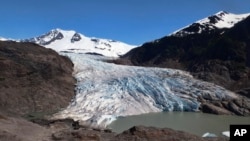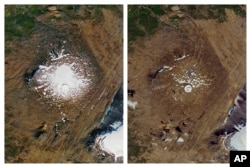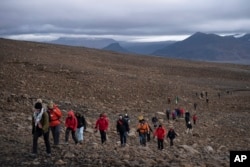A new study has found that nearly 70 percent of the world’s glaciers could disappear by the end of 2100.
A group of international scientists recently reported the study in the publication Science. They said their predictions were based on current climate change developments. However, the researchers noted many glaciers can be saved if planet warming is reduced.
The findings provide the most detailed examination yet of the world’s 215,000 glaciers.
The study considered four possible world temperature rises. One is a 1.5 degrees Celsius increase in the average world temperature. A 2015 international treaty, called the Paris Agreement, established a targeted long-term warming limit of 1.5 degrees Celsius above pre-industrial levels. The agreement aims to limit the harmful effects of climate change on Earth.
The study also considered possible temperature rises of 2, 3 and 4 degrees Celsius.
Regine Hock is a professor of geophysics at the University of Oslo and University of Alaska Fairbanks. She was a co-writer of the study. She told the French news agency AFP, “Every degree increase produces more melt and loss.”
Hock added that if Earth’s temperature can be reduced, glacier losses can also be limited. "In that sense, there is also a little bit of hope," she said.
The study found that even if world temperature rise is limited to 1.5 Celsius above pre-industrial levels, an estimated 49 percent of the world's glaciers would disappear by the year 2100. That amount of loss would represent about 26 percent of the world's total glacier mass.
Current estimates suggest that if climate change keeps heading in the same direction, the world is set to have a 2.7 Celsius rise in temperature. That increase would cause nearly all glaciers in Central Europe, Western Canada, the continental United States and New Zealand to melt by 2100, the study found.
If the world temperature rose as high as 4 degrees Celsius, large glaciers such as those in Alaska would be more affected and 83 percent of glaciers would melt away by the end of the century, the researchers predicted.
The scientists noted that glacier loss would also worsen the problem of sea level rise. For example, the study found that warming of 1.5 degrees would lead to an average sea level rise of of nine centimeters. Temperatures of 4 degrees would cause 15 centimeters of sea level rise.
The disappearance of glaciers will also affect water resources, the researchers said. Glaciers provide freshwater for about two billion people.
The study's predictions were reached through observations of the size of each glacier over many years. The researchers also used computer simulations to arrive at the new findings.
Hock noted that it is currently unclear whether the study’s estimates will come true. But she said the extreme predictions do not mean that it is too late to reduce glacier loss through human actions. Hock urged policymakers around the world to take action now to prevent such glacier loss from happening.
I’m Bryan Lynn.
The Associated Press and Agence France-Presse reported on this story. Bryan Lynn adapted the reports for VOA Learning English.
____________________________________________________________________
Words in This Story
glacier – n. a very large area of ice that moves slowly down a slope or valley or over a wide area of land
simulation – n. a creation of something that behaves or looks like something real but is not
_____________________________________________________________________
What do you think of this story? We want to hear from you. We have a new comment system. Here is how it works:
- Write your comment in the box.
- Under the box, you can see four images for social media accounts. They are for Disqus, Facebook, Twitter and Google.
- Click on one image and a box appears. Enter the login for your social media account. Or you may create one on the Disqus system. It is the blue circle with “D” on it. It is free.
Each time you return to comment on the Learning English site, you can use your account and see your comments and replies to them. Our comment policy is here.








Forum